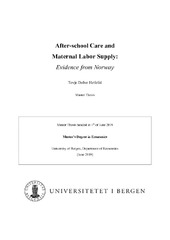| dc.description.abstract | In their pursuit to boost female workforce participation, governments have introduced family policy measures with a two-fold goal: to stimulate more mothers into the labor market, and for more working mothers to work full-time. In this master thesis, I show that publically facilitated after-school care in Norway has met only the first target. I use observations from a Norwegian reform from 1997, which gave a large group of mothers in 44 municipalities sudden accessibility to after-school care. Within a difference-in-differences research design, I separately examine the extensive and intensive margin of maternal employment. I find positive and statistically significant effects on mothers’ likelihood of entering the labor market. Simultaneously, however, the reform does not stimulate part-time working mothers to increase their labor supply. All empirical results have been computed using the statistical software Stata. | en_US |
